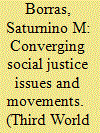|
|
|
Sort Order |
|
|
|
Items / Page
|
|
|
|
|
|
|
| Srl | Item |
| 1 |
ID:
162620


|
|
|
|
|
| Summary/Abstract |
The global land rush and mainstream climate change narratives have broadened the ranks of state and social actors concerned about land issues, while strengthening those opposed to social justice-oriented land policies. This emerging configuration of social forces makes the need for deep social reforms through redistribution, recognition, restitution, regeneration and resistance – book-ended by the twin principles of ‘maximum land size’ (‘size ceiling’) and a ‘guaranteed minimum land access’ (‘size floor’) – both more compelling and urgent, and, at the same time, more difficult than ever before. The five deep social reforms of socially just land policy are necessarily intertwined. But the global land rush amidst deepening climate change calls attention to the linkages, especially between the pursuit of agrarian justice on the one hand and climate justice on the other. Here, the relationship is not without contradictions, and warrants increased attention as both unit of analysis and object of political action. Understanding and deepening agrarian justice imperatives in climate politics, and understanding and deepening climate justice imperatives in agrarian politics, is needed more than ever in the ongoing pursuit of alternatives.
|
|
|
|
|
|
|
|
|
|
|
|
|
|
|
|
| 2 |
ID:
162616


|
|
|
|
|
| Summary/Abstract |
We argue that the multiple contemporary converging crises have significantly altered the context for and object of political contestations around agrarian, climate, environmental and food justice issues. These shifts affect alliances, collaboration and conflict among and between state and social forces, as well as within and between movements and societies. The actual implications and mechanisms by which these changes are happening are empirical questions that need careful investigation. The bulk of our discussion is dedicated to the issue of responses to the crises both by capitalist forces and those adversely affected by the crises, and the implications of these for academic research and political activist work. More specifically, we explore four thematic clusters, namely (1) class and intersectionality; (2) sectoral and multisectoral issues and concerns; (3) importance of immediate, tactical and concrete issues of working people; and (4) links between national and global institutional spaces and political processes. We know only a little about the questions we framed here, but it is just enough to give us the confidence to argue that these questions are areas of inquiry that deserve closer attention in terms of both academic research and political debates and actions.
|
|
|
|
|
|
|
|
|
|
|
|
|
|
|
|
| 3 |
ID:
138463


|
|
|
|
|
| Summary/Abstract |
Land and food politics are intertwined. Efforts to construct food
sovereignty often involve struggles to (re)constitute democratic
systems of land access and control. The relationship is two-way:
democratic land control may be effected but, without a strategic
rebooting of the broader agricultural and food system, such
democratisation may fizzle out and revert back to older or trigger
newer forms of land monopoly. While we reaffirm the relevance of
land reform, we point out its limitations, including its inability to
capture the wide array of land questions confronting those implicated
in the political project of food sovereignty. Our idea of the land
framework of food sovereignty, described as ‘democratic land
control’ or ‘land sovereignty’, with working peoples’ right to land at
its core, is outlined, with a normative frame to kick-start a debate and
possible agenda for future research.
|
|
|
|
|
|
|
|
|
|
|
|
|
|
|
|
| 4 |
ID:
079691


|
|
|
|
|
| Publication |
2007.
|
| Summary/Abstract |
Market-led agrarian reform (mlar) has gained prominence worldwide since the early 1990s as an alternative to the state-led approaches widely implemented over the course of the 20th century. This neoliberal policy framework advocates voluntary transactions between 'willing sellers' and 'willing buyers' and the removal of various 'distortions' from land and agricultural markets. Related policies aim to secure and formalise private property rights. Emerging evidence from across the developing world suggests that such policies are incapable of challenging the political and economic power of large landowners and are unlikely to meet the land needs of the rural poor and landless. In key areas such as land transfer, farmer development and programme financing, mlar is shown to be falling far short of its objectives. Meanwhile, it is being actively challenged by national and international peasant movements that are calling for more direct intervention by the state in order to restructure patterns of landholding and provide the necessary support for small-scale farmers, many of whom produce primarily for their own consumption. The future of agrarian reform, it is argued, lies not in a return to the top-down, statist models of the past but in new forms of partnerships between progressive political forces and peasant movements that go beyond the confines of the market to redistribute land and create sustainable livelihood opportunities for the rural poor and landless
|
|
|
|
|
|
|
|
|
|
|
|
|
|
|
|
|
|
|
|
|